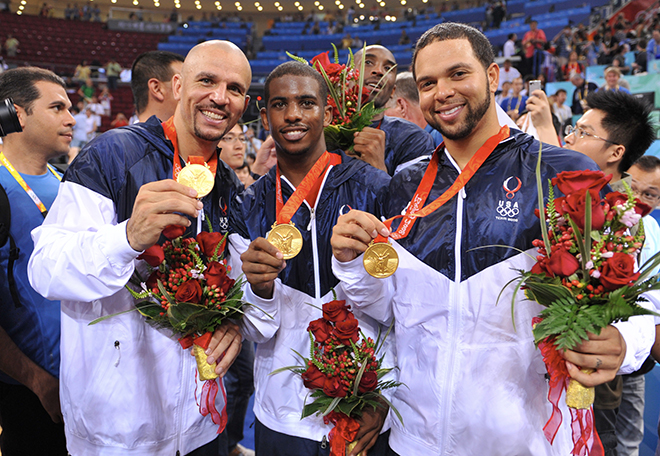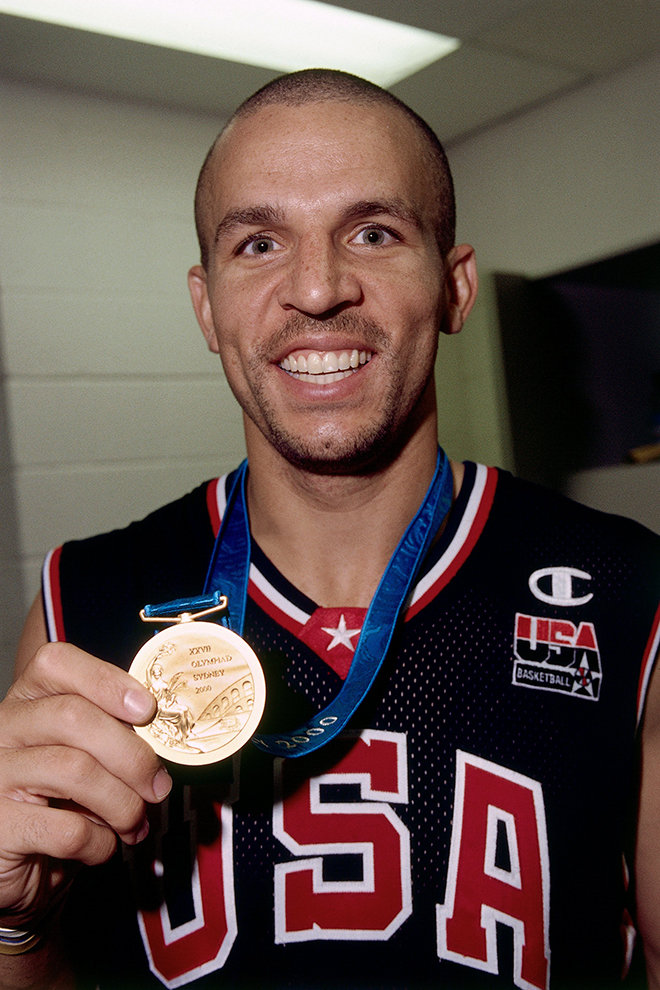When Jason Kidd’s basketball playing career is reflected upon, many words are used to describe him as one of the game’s all-time greats. One of those is “winner,” and in no place and time was that more true than that which J-Kidd spent as a member of the United States Men’s National Basketball Team.
Jason has a long history of success with USA Basketball, headlined by two Olympic gold medals, earned in 2000 and 2008, as well as three FIBA Americas Championship runs in 1999, 2003 and 2007. In fact, over his entire international career, Team USA never lost with J-Kidd on the team, going and incredible 56-0.
“Having two gold medals, it’s a dream come true. There are not a lot of guys who can say that,” Jason said after bringing gold back to the U.S. as part of the 2008 squad that was dubbed the ‘Redeem Team.’ “I’m undefeated. I told them I can retire now from international ball. This is something I will cherish a long time.”
Jason’s history of success with USA Basketball began in 1999, when the American squad breezed through the FIBA Americas tournament to qualify for the 2000 Olympics. Jason averaged 7.4 points and 6.8 assists per game while sharing time at the point with Gary Payton and Tim Hardaway and his efforts were vital toward punching the team’s ticket to Sydney.
He was just important to the cause when the team went to Australia for the Olympics the next year. J-Kidd scored four points and tossed out three assists as the Dream Team III had seven players in double figures to breeze past China, 119-72, to open the tournament. He added seven more assists the next time out as the American squad again cruised past Italy. After trudging past Lithuania, 85-76, the U.S. got back on track and trounced New Zealand 102-56 behind six dimes and five rebounds from J-Kidd.
France brought the toughest test yet in the USMNT’s final Group Play matchup, and Jason countered with his best game of the tournament. J-Kidd scored 11 points, dished out six assists and added three steals and three boards. The American side needed every bit of that effort in a hard-fought, 106-94 victory. After a Group A sweep, Jason got his squad off to a great start in the knockout round, flirting with a triple double—10 points, eight assists, seven rebounds—to top Russia.
The Americans were again challenged vehemently by Lithuania in the semifinal game, needing a tenacious defensive stand by J-Kidd on the final play to escape with an 85-83 victory. That win locked up a spot in the finals and a rematch with France.
J-Kidd and Co. cruised 85-75 to check off a big box on Jason’s list of career goals.
“Being able to watch the Dream Team, I just wanted to be a part of that,” Jason said. “And finally getting that in 2000 was something that was on my bucket list.”
Three years after the gold medal win in Sydney, Jason was an integral part of yet another FIBA Americas championship in 2003. He played in all 10 games for the U.S., doling out a team-high 50 assists as his team secured a trip to Athens for the 2004 Olympic Games. Unfortunately, an injury kept J-Kidd from participating in the 2004 Olympics—one that went down in infamy for Team USA basketball.
The American squad lost three times at the 2004 Olympic Games in Athens, Greece, including a defeat at Argentina’s hand in the semifinal round that forced the U.S. to settle for a bronze medal—the team’s first since professional players were allowed to compete in 1992—the year of the Dream Team. It was a massive disappointment and colossal setback for USA Basketball, one that took years to recover from.
With that in mind when Jason got a chance to make up for missing the 2004 Games four years later, despite being at age 35 for the 2008 Olympics he jumped on the opportunity to help restore USA Basketball to its former glory at the Beijing Olympics.
“It was a challenge because it was talked about how Team USA struggled in the past Olympics. So we wanted to make sure we were up for that challenge and that we could erase that bad experience,” Jason said. “I wanted to get back and represent my country. For me to have that opportunity in ’08, I was very thankful. Even being the oldest, I just felt I was part of the team, doing whatever a could mentally and physically to help the team.”
On the “Redeem Team,” Jason’s role was one of a veteran leader. The 2008 squad was guided by veterans like Jason and Kobe Bryant, as well as a new coach: Duke University’s Mike Krzyzewski.
“Coach K is great. I understand why he’s the best. He makes the game easy,” Jason says. “He always talked about playing as a team. It was Team USA from Day 1.”
Under Coach K, the USMNT left no doubt in Beijing. Eight players averaged eight or more points per game, and no one could touch Team USA. J-Kidd and Co. won by an average margin of 28 points per game, and they did it on both sides of the ball, scoring 106 points per contest and allowing just 78. The U.S. gave up more than 100 points just once: in the gold medal game against a tough Spanish squad.
But even that game was a relatively comfortable 118-107 victory, as the Redeem Team got its redemption and climbed back to the top of the Olympic podium. With eight impressive performances, Team USA was back and that rise back to the top of the world was a fitting way for Jason to end his international career.
“I think the biggest thing is when you look at the blowouts, the first Dream Team, they scared guys before they ever got to the floor. For us, the world’s gotten better, so it’s not about intimidating. It’s about playing the game the right way and that’s what we have done,” Jason said during that Olympic run.
Jason left USA Basketball in good hands, and several of his pupils from the 2008 team helped the U.S. breeze to another gold in 2012. In just days, Team USA will embark on a mission to secure the country’s third consecutive gold and 15th overall in men’s basketball in Rio de Janeiro, Brazil, site of the 2016 Olympic Games. As they look to build on USA Basketball’s past successes, the leaders of this year’s squad, like 2012 gold medalist Kevin Durant, know who wrote the blueprint.
“It’s great,” Durant said. “But you’ve got to look at the guys like Jason Kidd and Tayshaun Prince and Carlos Boozer, who were on that 2008 team. Dwyane Wade and LeBron, they set the foundation right now. They turned this whole thing around. We have to give them a lot of credit. We’re just following the path they laid for us. It’s not the guys that’s here, it’s the 2008 team that kind of turned the culture of USA Basketball around.”






